February 8, 2019
Pencil: A Story With a Point
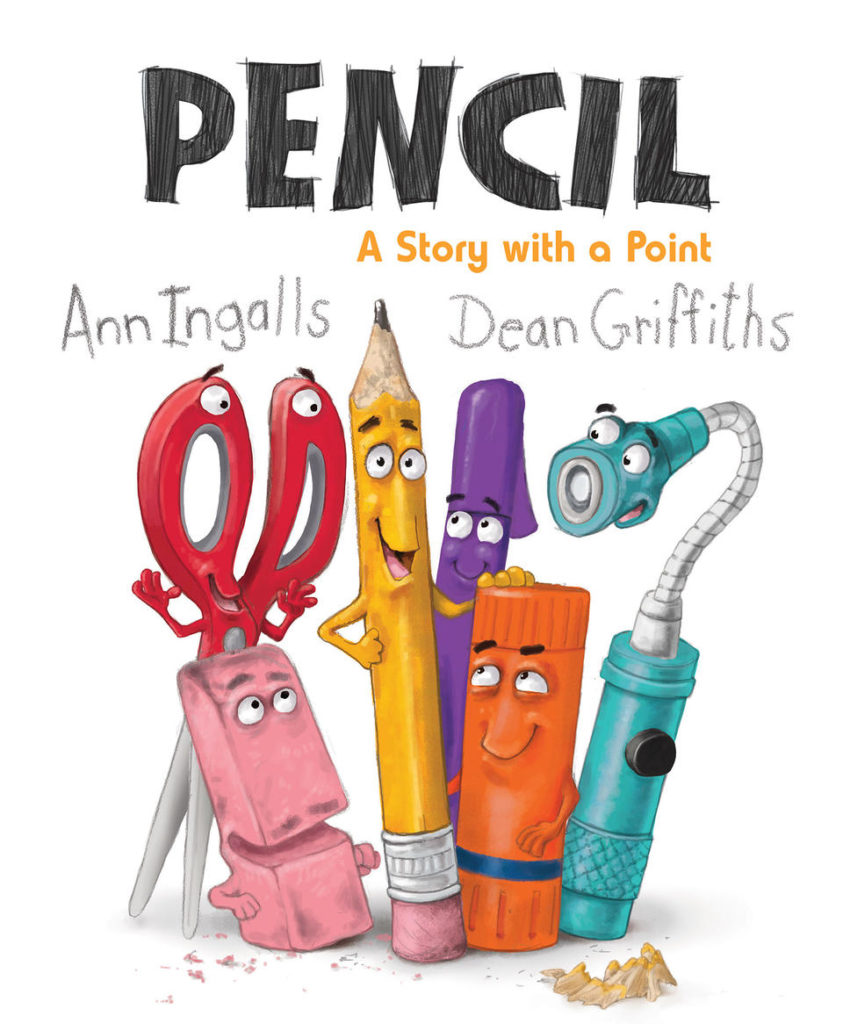
I will admit to being a bit wary of Pencil: A Story With a Point, by Ann Ingalls and Canadian illustrator Dean Griffiths. I am not convinced that the world necessarily needs more stories about anthropomorphized writing or colouring implements, plus I’d flipped through and saw it was also a story about the perils of too much screen time, and I’m wary of morals and screen fear-mongering. But the illustrations are very appealing (including very cool endpapers) so I sat down to read this with my daughter, and told her, “If we’re going to like this book, it’s going to have to be really good.”
And it was. Primarily, because (as might be discerned from the book’s subtitle) Pencil is playful with language and we never got tired of the puns–”You don’t measure up,” says the ruler in the junk drawer, alongside the spare battery who says, “He’ll get a real charge out of that/ ‘”Happy to hold things together,” said Paper Clip and Tape.’ It goes on, ‘”You’re a cut above the rest,’ said Scissors/ “Our friendship is permanent,” said Marker.’
And while this indeed a pencil versus tablet story for our screen saturated age, it’s also more interesting than just that, about a boy who loved his pencil until he abandoned it for tablet pursuits, and then Pencil was rescued from the junk drawer by the boy’s sister, and was there to see it happen: the tablet crashing to the floor and breaking, the boy distraught. Is there anything that Pencil can do?
The part where Pencil fails to make the boy feel better by showing him all the awesome things pencils can do (“He could be a tent pole for a really small tent.”) was very funny, and then, with the help of his junk drawer friends, Pencil arrives at an ingenious solution. Pencil and the boy are reunited. A happy ending to this warm and humorous book which demonstrates that a story with a point is not necessarily a bad thing. It’s all in the delivery, and this one is done right.
February 7, 2019
When Old Books Are New Again

In December, I posted a photo of the book I was reading, Busman’s Honeymoon, by Dorothy L. Sayers (which I purchased at Sleuth of Baker Street), and my friend Leah (a Sayers fan) commented in disbelief that there existed a copy of a Dorothy L Sayers book that was brand new. “I bet the pages don’t even fall out of that one,” Sara added to our conversation, and they really didn’t. And as the only other Sayers novels that I’ve read before have been cheap and battered paperbacks (one that was withdrawn from the North York Public Library), I understood their amazement at my pristine, brand new, spine un-cracked, and with an attractive cover. What does it even mean to read a Dorothy Sayers novel whose pages aren’t held together with an elastic band and which doesn’t smell like mildew? Surely the experience is a little inauthentic?
But it really wasn’t. Great binding and legible text would only add to the experience of a novel that’s pretty enjoyable in its own right. A fresh book will be approached with a spirit of freshness as well, which was only further demonstrated to me when I received a copy of Edith Wharton’s The Age of Innocence for Christmas later that month.

Of course, it wasn’t just any copy of Edith Wharton’s The Age of Innocence. I’d asked for the edition published by Toronto Gladstone Press (owned and operated by celebrated Canadian book designer Ingrid Paulson), a book I’d decided I had to have when I saw the image of the New York City map circa 1879 inside it. I am a sucker for maps in books, plus there were the opera glasses on the cover, and the beautiful, beautiful spine. Is it possible to fall in love with a book for its spine? Reader, I assure you that it is.
On her website, Paulson describes her mission with Gladstone Press as follows: “Old books aren’t always boring. They aren’t necessarily hard to read. They aren’t the ‘bran’ of literature (good for you, but not much flavour). They just end up looking that way. So I am trying to change that.”

I’ve never read The Age of Innocence before. Honestly, take an objective look at the covers of previous editions and ask yourself why I’d even want to. Because I felt like I probably should, mainly. (Winner of the Pulitzer Prize in 1921!) But I’ve got a personal aversion to languid ladies lounging in chairs, and the 1993 movie tie-in edition makes me uncomfortable—what IS that man doing to poor Michelle Pfeiffer’s neck? But those opera glasses: that’s the book I want to read.

And I loved The Age of Innocence, reading it with a pleasure over a single day during the holidays, nothing bran about it. It was an absorbing story of a once-upon-a-time New York that was also timeless, and daring, grappling with problems of women’s liberation that we’ve still not got our head around a century later. Which is to say that there is nothing stale about this novel, and it was a pleasure to discover it in this beautiful edition whose design provides the freshness that such a book deserves.
- Learn more about Gladstone Press, whose other titles are Wuthering Heights and The Hounds of the Baskervilles. And more books are coming this spring.
February 6, 2019
Winter Reads on the Radio
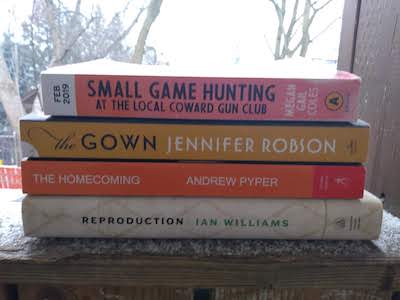
I was on the radio talking winter reads this morning as ice pellets were falling from the sky. Two of them are books I’ve loved, and the other two are books I’m looking forward to loving. Listen again to my selections here: I come on at 42.10.
February 5, 2019
Small Game Hunting at the Local Coward Gun Club, by Megan Gail Coles
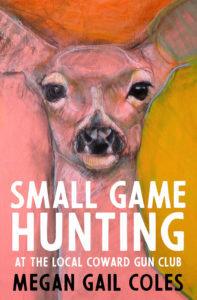
If you hang a pistol in your novel’s title, law dictates that it’s going to go off before the book is over, even if your gun is a metaphoric one. And if the title of Small Game Hunting at the Local Coward Gun Club is not indication enough that this book is not going to be completely painless, its author, Megan Gail Coles even includes a warning: “This might hurt a little. Be brave.” But yes, be brave. Venture forth into this book, where the weather is extreme and feet are freezing, and nobody is holding your hand. Where the atoms fall like snowflakes in a blizzard, instead of orderly, in a straight line, one thing after another, as you’d expect from a more linear text. There are moments when you’ll find yourself lost in the storm, zero-visibility. But just keep going. Be brave.
There are sentences in Coles’ first book, Eating Habits of the Chronically Lonesome, that I have never forgotten, more than four years after I read them first. “The reason Garry did these things was ’cause he couldn’t afford any better. Half of what he earned over at Pretty Paws was carted off to Newfoundland. Child support for an autistic kid he had with Slutty Marie down Gilbert Street, this the result of a one night stand./ Have you ever heard a sadder story, Dame? I mean, really? I barely poked her.” Not a comfort read, you know what I am saying? Unforgettable, dark, slyly humorous, meticulously crafted sentences. I have been looking forward to Megan Gail Coles’ debut novel for a long time, and while it hurt a little, it also did not disappoint.
Ostensibly, Small Game Hunting... is the story of a trendy restaurant in St. John’s over the course of a single day in February while outside a snowstorm is raging. The chef has been sleeping with the hostess who is serving his wife’s father (whose money funds the establishment) as he has lunch with the city’s mayor. The bartender is in love with the hostess. The server is hungover. And the woman who’s been waiting in the doorway, without her boots on and cold and wet and aching feet, has ties to the hostess, as they grew up together in rural Newfoundland, and to one of the restaurant’s customers, who not long ago caused her irreparable harm in an act of violence. And all of these characters have parents and sisters and ex-best friends who now hate them for justifiable reasons. “Sometimes John looks around the restaurant and wonders who is in the most trouble.”
It’s not an easy book. There is violence and there is trauma and there is an attention to language that requires the reader’s full investment, and while that investment pays off big time, the demand might also try some readers’ patience. Because Megan Gail Coles is asking a lot of her readers here, but she more than pays it back—not least of all letting plot be a huge incentive to keep on turning the pages. The tension is enormous in this web of emotions, ties and betrayals, and that proverbial gun is due to go off at any moment. The chef is fucking the hostess in the kitchen as his wife is coming down the street—you get the idea. The novel moving between each character’s point of view to add layer upon layer of meaning, and each character’s section has also its own voice, specific diction, preoccupations. It is a dizzying experience indeed to reside in so many minds at once.
But it’s also so rich, and we gain sympathy for even the most hapless characters, because nearly everyone in this book has done despicable things. And we see too the way that certain characters are imminently more forgivable than others, how they get away with everything, and by “certain characters,” I mean white men. “The defences of their choices would be vicious.”
In a recent profile, Coles described her novel as “a declaration of war on misogyny,” which is such a perfect articulation. Small Game Hunting at the Local Coward Gun Club is about the nonchalance with which men do harm to women, which is also a microcosm for an economic and political system that renders certain kinds of people disposable. Characters in the novel are robbed of opportunity, are played by institutions they trusted, are wracked by debt and addiction and systemic oppression. There’s a Gatsbyesque arc to the inevitability of their fates. And the men who cheat? Those reckless, careless characters? The bullet was never going to hit them. One way or another, they’re always going to be fine.
February 4, 2019
Gleanings
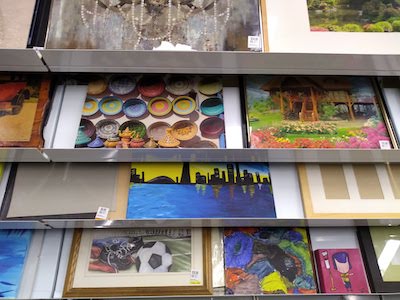
- I have never had something I dreamt of so fully come into reality as blogs.
- What a rutabaga does better than anything else
- I may not want to shovel, but I want to be a shoveller
- While I’d previously treated my favourite shows as a way to tune out, I began treating books as a way to step into a place far from where I was
- But the nude beach urged me to imagine my body as mere flesh on frame, neither symbol nor cyborg.
- Boys are told that they have a say in what a woman does with her body and girls are told that they don’t over their own.
- Generally, I’m attracted to -ish. The ambiguity, the grey area—fiction’s territory.
- Instead of letting an unjust culture flow through us, we can interrupt it — and we can make a new one.
- Lying in bed in our cozy room, all night I could hear the muffled sounds of the crashing waves.
- Just when you thought you’d hit the parenting jackpot, things get even better
- To end the day by staring at a technicolor Kestrel is nothing short of magic.
- Examined with an analytic eye and a diagnostic ear, sexist language reveals an underlying social disease — contempt for and fury at women.
- “putting pressure, even just a form of social peer pressure, on individuals to share their mental health problems as the HIGHEST GOOD is a bit of an issue for me.”
- So it happens again. Courtship, mating, birth, nurture. It’s all in the song
- It’s like I invented Bruce Springsteen.
January 31, 2019
On Meeting the Austins
Like many bookish people, A Wrinkle in Time played a big role in my literary foundation, although it was the third book in Madeleine L’Engle’s series, A Swiftly Tilting Planet, that I was really passionate about, and have reread many times since. Because although …Planet is fantastical and concerned with time travel and parallel universes, it is very much of this world, which has always been what I’m interested in most. My favourite parts of A Wrinkle in Time were the scenes set in Meg Murry’s kitchen, the meals her mother cooked on her bunsen burner. Likewise, in …Planet we’re back in that same place as the Murry family (Meg pregnant with her first child) awaits perilous news in global politics, a ruthless dictator with his finger on the nuclear button…and Meg’s brother, Charles-Wallace, travels back through time with a unicorn, to mend the brokenness through history that led to the current crisis, brokenness that has always been rooted in family connections or lack thereof. I love this book, and it has brought me tremendous peace and comfort many times.

I loved Meet the Austins. I found it intelligent and comforting, and I knew that Harriet (age 9.5) would love it too. There is not a plot exactly, instead episodes as the characters move in and out of weeks and days. I loved the way that Vicky understood that her family was a kind of cocoon and the questions she was asking about the world outside it, and her apprehensions were the kind that so many children have (and that I have never entirely been able to abandon). It’s a novel that respects its reader, and I enjoyed reading it so much that for days after I lamented that I did not have those few hours to go through again, when I had sat down with this book and been so thoroughly satisfied.
Meet the Austins was published in 1960. In 1962, L’Engle would publish her most famous work, A Wrinkle In Time, which must have meant that by the following year, when The Moon By Night (the next Austin book) was published, her world was a very different place. The world in general was a different place, however, and The Moon By Night is wholly infused with that ominousness, post-Cuban Missile Crisis and the imminent possibility of a nuclear strike. Also, Vicky Austin is 14, which is never a great age, and the world as she knows it has, in fact, already ended—her family are leaving their small town for a new life in New York City, but first, they’re about to drive across the country, a summer vacation never to be forgotten.
It’s a long journey, and on page 83, Vicky’s sister asks her older brother, ‘Hey, John, couldn’t you just tesser us there?’ and Vicky thinks, “It would have been nice if he could have, like Meg and Charles Wallace Murry, but that as Kipling would say, is another story.” Which is the first place L’Engle’s two universes intersect—I love the idea that Vicky Austin has read A Wrinkle in Time too.
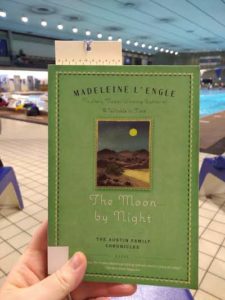
The Moon by Night is remarkable for introducing the most irritating character in all of literature, Zachary Grey, certified beatnik, Holden Caulfield redux, as he’s been kicked out of prep school and calls everyone phoneys. He’s travelling across America with his own parents, who are disinterested and self-absorbed (although you might be too if Zachary Grey was your son). It’s the end of the world as we know it, but Zachary Grey feels fine, and he’s blasé about nuclear annihilation, and patronizes Vicky for her religious leanings. He is an appalling fuckwit, who latches onto Vicky as soon as they meet and calls her Vicky-O, and none of the other Austins can stand him, but Vicky finds him interesting which makes me concerned she’s going to spend her whole life attracted to damaged men who need fixing. He’s also a chauvinist, but who’s not in this novel. When Harriet read Meet the Austins, she was furious about the ways that Vicky is subservient to her brilliant older brother, and the gender dynamics are far more overt in the second book—”Daddy doesn’t like women in pants…” Oh, please. Vicky spends the entire book a passive agent as she’s passed from one jerky boy to the other. Her dad also uses judo kicks to take down a gang of “hoods” attacking their campsite. There’s a prowling bear, deadly floods, and at one point Zachary hides for hours so Vicky will worry come find him, that manipulative bastard, and there is a landslide and they’re trapped for hours, and she doesn’t even let the fact he’s put her life in jeopardy make her consider that she should never ever speak to him ever again.
Does it sound like I didn’t like this book? Not so. Weird ‘sixties slang and other factors aside, I still really loved it. And that I loved it in spite of all the reasons it was terribly annoying is a testament to its value. It’s a novel for a much older reader than Meet the Austins, maybe ideally one who is 39.5 years old and is worried about the state of our world. There is a line in it about Vicky and Zachary’s being the first generation who’s not assured of there being a future, and not the last then, I supposed, and there is some comfort in that, that our world has known peril before. Vicky thinks about her uncle, who was killed in the plane crash in the first book, and the genocide against Native Americans across the country they’re travelling (and it’s remarkable that L’Engle was using the term “genocide” in 1963), and Anne Frank in the Holocaust, and as they travel back east through Canada, she learns about the landslide in Frank, BC, and it haunts her just as much as everything does.
How do you live your life, how can you have faith any, knowing it could all just end at any moment for absolutely no reason? How do you love a world that is home to so much that is just awful? Questions I’m thinking about all the time, so The Moon By Night moved me, decades later. I appreciate too that L’Engle’s religious themes have a universality about them so that the answers apply to those of us who are not Christian, and further that her Christianity is underlined by such largesse, generosity, such grace.
Zachary Grey is one of the characters who appears in subsequent books featuring the Murry/O’Keefes. (Fingers crossed it’s just repeated scenes in which his eyeballs are pecked out by crows.) I want to read them now and see who he is in that other universe, and I look forward to the next Austin book now too, which apparently has its realism shaken a bit with the appearance of aliens. I can’t even… The Young Unicorns is next. I will keep you abreast of my progress.
January 29, 2019
Big Snow
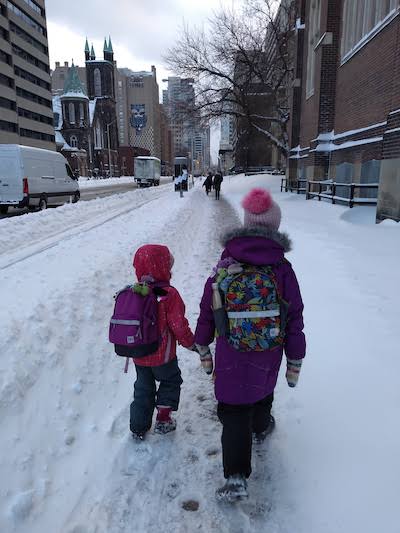
Today instead of swimming, I shovelled snow; and we took the main streets to school instead of the side ones; and school started fifteen minutes late; and the people were walking and the cars were all buried; and there were sleds in the bike racks. People were outside their houses shovelling, and greeting passers-by; and pedestrians were smiling, and for those of us without mobility issues, it was all kind of beautiful and miraculous, except for climbing over snowbanks. But even that part was its own adventure.
January 28, 2019
Can You Tell I’m Turning 40?
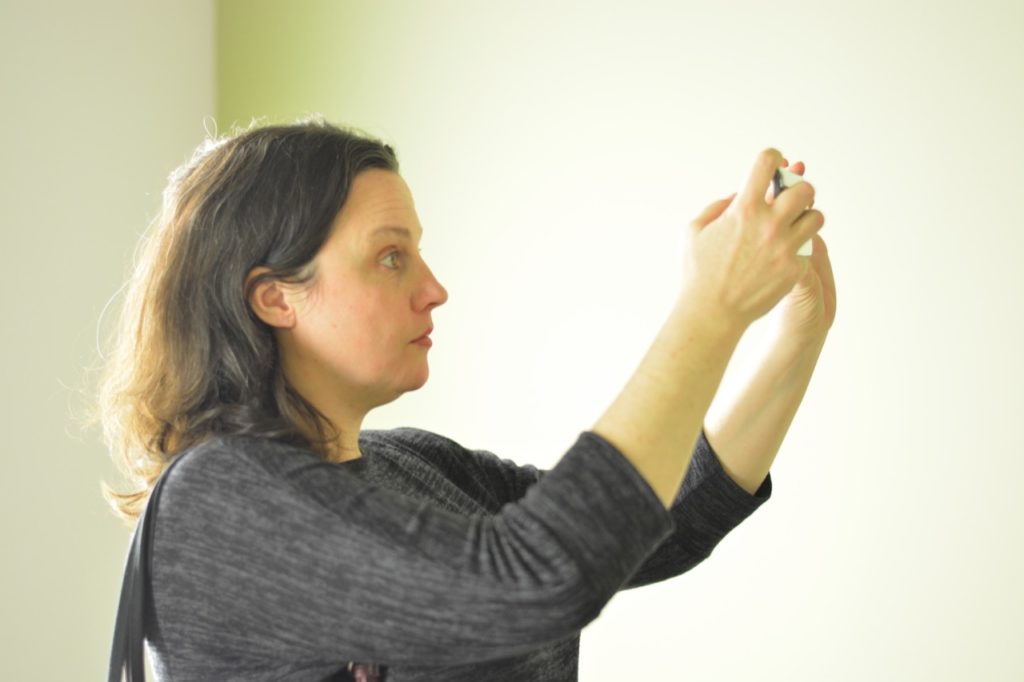
I bought a Brené Brown book a couple of weeks ago, in case it wasn’t totally obvious that I’m turning forty in the next six months and am currently experiencing a mild case of the kind of existential crisis that necessitates some reinvention. Although I must confess that I am not finding the book (Daring Greatly) to be such a revelation. As anyone who has read my blog for five minutes can attest, I don’t have a problem with being vulnerable, and perfectionism has never been a force that I’ve had to go to battle with in any part of my life. Instead, it’s with “imperfectionism” that I’ve found my strength as a creative person during the last decade, as a blogger in particular. Which is mostly the art of being a human—and I excel at that. (We all do.)
But what has prompted my mild crisis is the dawning awareness (which I alluded to in my ambivalent post about your stupid bullet journal) that imperfectionism has its limits too, and that it’s possible to be using it as a kind of a cover, a retreat. An excuse to not to bother to be any more ambitious, because that’s just not my brand, man. Because brands are not my brand, man, which is fine, but what if part of the reason I’m so comfortable being merely good-enough/imperfect and not having to make the effort is not so much because effort is distasteful, but because I’m afraid of trying and failing and having everybody see? Because I’m scared of trying to figure out a new path forward, of stumbling and making mistakes in public view. All those things that I’ve been able to counsel writers through with blogging—I’m comfortable showing my process here—but I’ve been hesitant to apply the same lessons in other areas of my life. Now I’m turning forty, however, and I think it’s finally time.
In the last ten years, without deliberateness and mostly due to persistence, luck and a passion for books that is as organic as gut bacteria, I’ve been able to create a unique place for myself as a writer, as a reader, as a reviewer, and a literary critic. It’s a place that I’m amazed by now, by the opportunities and connections I’ve been able to experience, and I’m grateful for all of it. But this place is also a tricky kind of place as well, because I’m not just a reader, I’m not just a writer, I’m not really an editor, I’m not just a blogger, I’m not simply an impartial critic, and I’m not a proper journalist either. And my failure to fit properly into these pigeonholes (in a newspaper/magazine/publishing industry that has fewer and fewer opportunities to offer all the time) has bothered me, and made me feel like I was doing everything wrong sometimes, made me feel like the space I’ve come to inhabit as a writer and a reader is the problem after all.
But it’s only a problem if I’m sitting around waiting for other people to deliver me opportunities, you see? Which is why I’ve decided on a new approach for a new year and a new decade, why I’ve decided to finally begin work on projects I’ve been wanting to do for years, why I am going to start being more deliberate and entrepreneurial in my professional life—because the unique place I’m in also offers opportunities. And my blog will be the centre of that—it’s been the centre of everything. Part of my distance from my blog last fall was because it felt like undervaluing my thoughts and ideas to be publishing them here rather than on a more legitimate publishing outlet. But then why wasn’t I feeling that way about the thoughts and ideas I was posting to Twitter and Facebook? This question clarified so much to me. What if, instead of composing Twitter threads and having Facebook arguments with your weird cousin, I was posting here instead? The back-to-the-blog movement, as I wrote the other week. It all coalesces here. I still love writing for magazines and newspapers, and the opportunity to work with editors, but what if I stopped looking at blogging as a kind of defeat. What if I worked to build my audience here, to build my newsletter, perhaps to have non-annoying advertising and make some revenue there? To build on something that is mine.
I am so excited about blogging right now. Yesterday I said that to my husband, about how on Sunday I look out at the week ahead and all the things I plan to write about—I wasn’t feeling so inspired a few months ago. But I really am now, with a renewed appreciation for the kind of space a blog can be, and a certainty that we need blogs more than we ever have—which makes it advantageous that I’m finally planning to launch an online blogging course in September. The Pickle Me This Blog School is in the works and I look forward to applying what I’ve learned from nearly twenty years of blogging and eight years of teaching blogging to show people how to create a blog that fits their lives and even makes life richer.
I’m also going to be working to engage people to connect with writing and storytelling in other ways, to inspire them to find and make time/space in their lives for books and reading. Partly through what I’ve always done via my blog and other platforms, but with other projects and initiatives as well, plans I’m hatching now. And I hope that you’ll be excited (and inspired!) too as it all starts to come together.
January 27, 2019
Gleanings
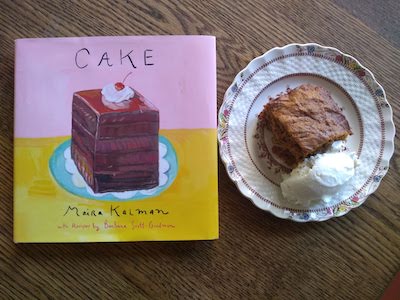
- There must be prejudice in us, to say that if someone’s in trouble, it is self-made, it is their fault. But there should be space in the world for people who need it: I am living proof.
- “I’m so glad this place is still here,” I thought while eating comfort food and getting warm.
- I think this is one of the most wonderful things about the public library – that it expresses faith in people, just by existing, really.
- I still don’t like it. But while liking or not liking a book may be, as Henry James put it, “that primitive, that ultimate, test” for us as readers, it really can’t be the ultimate test for those of us who are also scholars, teachers, or students.
- Or simply in the cycle of the seasons, of which winter is one.
- When you’re going through a hard time, reading can be a total salve.
- As if this isn’t enough incentive to consider writing an occasional letter, I’ve recently learned that when we write in cursive, divergent parts of our brains are activated…
- Cost of simplicity
- I think about writing about swimming all the time.
- I change my mind about what a short story is nearly every day.
- Albeluhn, 53, never set out to change the global online trajectory of banana bread.
- January is National Soup Month, so have a big bowl!
- 8 More Ways To Read (A Lot) More Books
- and it wasn’t until that moment that I realized how important making plans was…
- There always was, and still is, a longing to my status as a reader…
- An ode to the white board
- It’s so very much like birding, really: you go out there, no matter the weather, and what you end up seeing will, without a doubt, surprise you if you’re open to noticing what’s in front of you.
- “History gives you context and understanding and it gives you some warning signs. It’s not going to repeat but you can say ‘Be careful here’.”
- The contrast between the start and the end of my parents’ relationship was stunning. How had one thing become the other?
January 25, 2019
A Velocity of Being: Letters to a Young Reader
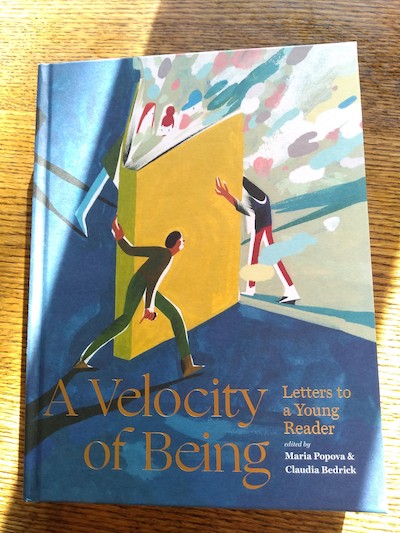
Confession: There are some beautiful books in my house that I have never read. Oversized coffee table volumes with gorgeous design, ribbon bookmarks, incredible illustrations, fascinatingly edited, but they’re more furniture than literature. Or maybe they’re aren’t, but I’m unlikely to ever find out, because while I appreciate these books as objects, nothing has ever compelled me to sit down and start reading them. But A Velocity of Being: Letters to a Young Reader, edited by Maria Popova and Claudia Bedrick, a beautiful book with endpapers to die for? Reader: I read it all, many parts aloud. A book that’s as good as its package; even, a book for the ages—all of them.
This collaboration is a “labour of love” between Popova (of Brainpicker) and Bedrick (publisher of Enchanted Lion Books), with all proceeds benefitting the New York Public Library system, and situated as a demonstration that “a life of reading is a richer, nobler, larger, more shimmering life.” It’s a collection of letters from readers—who also happen to be writers, rock stars, astrophysicists, artists, business moguls, philosophers, Lemony Snickett, Shona Rhimes, activists, composers, radio producers, Judy Blume, and more—about the role of reading in shaping their lives. There’s Rebecca Solnit, and Maud Newton, and Mary Oliver, and Leonard Marcus, and Ann Patchett, and Yo Yo Ma, and Shirley Manson, and Jane Goodall, and Ursula K. Leguin, and so many others, each letter paired with an illustration by artists including Maira Kalman, Isabelle Arsenault, Liniers, Olivers Jeffers, Marianne Dubuc, Shaun Tan, and more.
It’s a beautiful, thoughtful, inspiring book, and the greatest thing I got from it was company. Because while I appreciate the solidarity I share with my bookish friends online and in the world, I have increasingly, lately, wondered if we are outnumbered in the general population. As I read statistics on how few adults read for pleasure, about declining book sales, as I hear one more person who binge-watches Netflix talk about how they just can’t find the time to read. I despair for a future in which people don’t understand the value of reading and the riches that books can deliver us… but then this beautiful book is a reminder that it’s not all lost. Not yet. That these riches are still abundant, and foundational, they bring us together, and they remind us that the world is amazing. Still.





